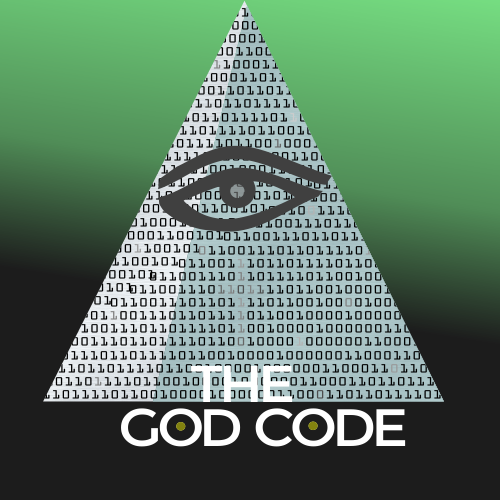
by gcadmin on Monday, May 7th, 2018 No Comments
Let me explain why below.
 The logo for the God Code I adopted a couple of months ago has been mostly well received. A friend suggested the basic concept and I built on top of the original idea. I liked the various components individually – the eye of Horus, the Pyramid, the binary code, the cross – and the intended symbolism behind each of those components also aligned well with my vision of the God Code – connecting technology and science with Ancient wisdoms and God.
The logo for the God Code I adopted a couple of months ago has been mostly well received. A friend suggested the basic concept and I built on top of the original idea. I liked the various components individually – the eye of Horus, the Pyramid, the binary code, the cross – and the intended symbolism behind each of those components also aligned well with my vision of the God Code – connecting technology and science with Ancient wisdoms and God.
However, there have been a few people that did not like the logo, suggesting it represents the IIluminati, or even more basic that it was ‘evil’. I can absolutely tell you this is not true. The God Code logo is intended to symbolise goodness, wisdom and respect for God.
I explained a little what the symbols in the logo meant in a comment a few weeks ago.
Here is what I said:
“The pyramid shape shows a hierarchy of rules/wisdom – getting higher where more is learnt and closer to the ‘highest’ – the creator/God.
– The eye is based on the Egyptian eye of Horus – which in the myth can see far and wide and represents seeking truth and wisdom and *fighting chaos* (evil).
– The 1’s and 0’s are actually binary for the ‘God Code’.
– There is also a cross embedded in the pyramid – the vertical is the connection from heaven to earth, and the horizontal is the spreading of the word (wisdom from bible) all over the world – east to west etc – spread the word of God in the human plane.
– The three points of the pyramid represent bringing 1. science, 2. wisdom from bible into 3. singular point of wisdom closer to creator/God/heaven.”
This helped some – but there were still some who didn’t like it. So I brought in the Cavalry – Jonathan Pageau.
Jonathan is a talented artist specialising in orthodox religious iconography and symbolism. I have watched many of his talks and videos and highly recommend them. I have learned much from his explanations, There are symbols and meaning in so many places – in church, in the cross, movies – pretty much everywhere.
His web site is here. Watch some of his videos – this one on The Matrix is fascinating. Jonathan looks at the symbolism present in the movie as it stands. (I wrote an article recently that explored morality and reaching heaven using Matrix like ideas)
This video is quite relevant – Jonathan talks about a Mountain and hierarchy (like a pyramid).
He explains that as you get higher in the mountain you can see more. He also talks about how Christ is the head of the Church – so is at the peak of the mountain/pyramid.
So, given the questions and comments about the God Code logo, I asked Jonathan what he thought of the logo.
Here is what he said:
“The pyramid with an eye is not demonic. It is an image of God as the all-seeing eye. Today though, it is being associated by conspiracy types exclusively with freemasonry. For sure it is weird to have binary language inside the triangle because the whole point of the ONE eye is to transcend the duality of being and non-being. So I wouldn’t say it is demonic. ” – Jonathan Pageau
My original choice of Horus and the wisdom of the seeing eye was inspired by Dr Jordan Peterson.
“So what do you do if your life isn’t in order? You bloody well pay attention. And that isn’t the same thing as thinking, it’s a different process. Thinking is like the imposition of structure in some sense… but paying attention is like watching for what you don’t know.
So that’s the idea that climbing up a hierarchy of authority can give you vision, and that vision can transcend the actual hierarchy.” – Dr Peterson
The Full Dr Peterson lecture here.
The “Eye of Providence” goes well back to the early Christian era. (Eye of Providence history).
It pre-dates the Illuminati and their re-use of the symbol by many centuries,
The logo says to aim for the highest knowledge – open your eyes, see and absorb the wisdom from our tradition, the bible and Jesus.
Aim high and do something meaningful!
The view from the top of God’s pyramid is breathtaking.
Posted in Jonathan Pageau, Jordan Peterson, Meta, Religion, Symbolism.